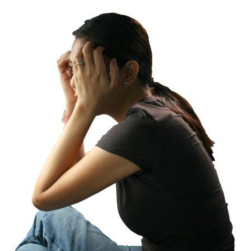Anxiety
 While worry and stress are an everyday part of life we all must deal with, when anxiety develops to the point a feeling of apprehension or fear is overwhelming a disabling condition can occur. Anxiety disorders are among the most common mental illnesses today, affecting at least 10 percent of the people Western countries.
While worry and stress are an everyday part of life we all must deal with, when anxiety develops to the point a feeling of apprehension or fear is overwhelming a disabling condition can occur. Anxiety disorders are among the most common mental illnesses today, affecting at least 10 percent of the people Western countries.
Oerview
Anxious people typically have a constant feeling that something "bad" is going to happen. Some fear they have a chronic or dangerous illness, a feeling that can be reinforced by the symptoms which can easily occur during bouts of anxiety. Some of the other symptoms include dryiness of the mouth, excessive sweating, dizziness, digestive problems, and the constant need to defecate or urinate.
Causes
The people who suffer from prolonged attacks of anxiety frequently have histories of early loss or extreme stress in their lives. Some of the physical causes can include:
- Diabetes
- Anemia
- Menopause
- Premenstrual syndrome
- Thyroid disorders
- Low blood sugars (hypoglycemia)
- Endocrine tumors
- Pulmonary disease
- Various heart problems
This condition can also be caused by drugs such as cocaine, diet pills, amphetamines and caffeine. Some cases of OCD are blamed on an imbalance of a brain chemical called serotonin, and many researchers now believe chemical imbalances in the brain may play a factor in anxiety and other social disorders.
Types
The different types of anxiety disorders include panic disorder, obsessive-compulsive disorder, phobias and post-traumatic stress disorder. Below three of these disorders are expanded upon:
- Generalized anxiety disorder - Nearly twice as many women as men suffer from this disorder that typically lasts six months or longer and sees the individual suffering from constant worry and nervousness. At least three of the symptoms of the following symptoms must be present: fatigue, restlessness, difficulty concentrating, irritability, muscle tension and sleep problems.
- Panic disorder - This condition is characterized by panic attacks that strike a person without any warning, causing them to have feelings of terror along with the physical symptoms of heart palpitations, chest pain, dizziness, abdominal pain, shortness of breath and a fear of dying.
- Obsessive-compulsive disorder - In this disorder, anxious and disturbing thoughts or images are obsessions, while the rituals the person undertakes to get rid of them are called compulsions. These feelings can last for at least an hour a day and interfere with daily life. A person with OCD may have the overwhelming fear of coming in contact with germs, will consequently wash their hands hundreds of times a day. OCD affects women and men equally and usually starts in childhood, adolescence or young adulthood.
Prevention
It is not always possible to prevent anxiety disorders. However, teaching people to learn the difference between true risk and simply fears is core to prevention and treatment. Some studies have also shown the benefit of regular exercise and the use of relaxation methods such as meditation and yoga.
Avoiding caffeine, drugs, and stimulant-0containing over-the-counter medication can help lessen the symptoms of this disorder.
Diagnosis
A diagnosis of anxiety is based on the symptoms the individual is exhibiting. Also, a thorough medical examination can rule out other possible causes. It is essential to remember that more than one mental illness can exist in a person at the same time. Anxiety is frequently accompanied by other disorders such as depression, substance abuse, eating disorder, or other disorders.
Treatment
Anxiety disorders are frequently combined with psychotherapy and medication.
Medications include serotonin reuptake inhibitors (SSRIs), a class of antidepressants. These drugs can take two to three weeks to become effective in the body and sometimes worsen the symptoms when first taken. They are often used for generalized anxiety disorders and OCD.
Psychotherapy includes cognitive-behavioral therapy and is effective for many people with this type of disorder. Cognitive therapy changes thinking patterns that in turn allows them to change their reactions when placed in a situation they fear. This allows patients to learn first-0hand that they can handle the events they formerly feared.
Group therapy is helpful for some people as they discover they are not alone in their fears and anxiety.
Meditation helps some people alleviate their feelings of anxiety. Some research studies show changes in brain waves when people meditate. Breathing exercises can be extremely effective. Hyperventilation (or very rapid breathing) affects the flow of oxygen and blood to the brain and can cause dizziness and confusion. Learning how to control one's breathing helps avoid this condition. Biofeedback may also be helpful.
A natural supplement that has often found to be helpful to anxiety is kava. Made from the dried roots of the shrub Peper methysticum, kava has long been known to be effective for anxiety. People with liver damage may want to avoid this supplement.
Some physicians suggest anxiety may be caused by:
- Food allergies
- Sugar
- B vitamin deficiencies
- Alcohol
- Caffeine
References
- Bratman, S. (1998). The Alternative Medicine Ratings Guide: an expert panel rates the best treatments for over 80 conditions. New York: Crown Publishing Group (1998)
- Brown, L. (1999). Alternative Medicine. London : Teach Yourself
- Carmen, R. (2009). The consumer handbook on hearing loss and hearing aids : a bridge to healing. Sedona, Ariz. : Auricle Ink Publishers
- Deepak Chopra, M.D. (2002). Alternative Medicine: The Definitive Guide. Puyallup, Wash. : Future Medicine Pub.
- Duke, J. (2003). The Green Pharmacy: Herbal remedies for common diseases and conditions from the world's foremost authority on healing herbs. London : Rodale
- Servan-Schreiber, D.(2006). The Encyclopedia of New Medicine: Conventional & Alternative Medicine For All Ages. London : Rodale
Posted in Anxiety
Ask a Question Or Join a Discussion


